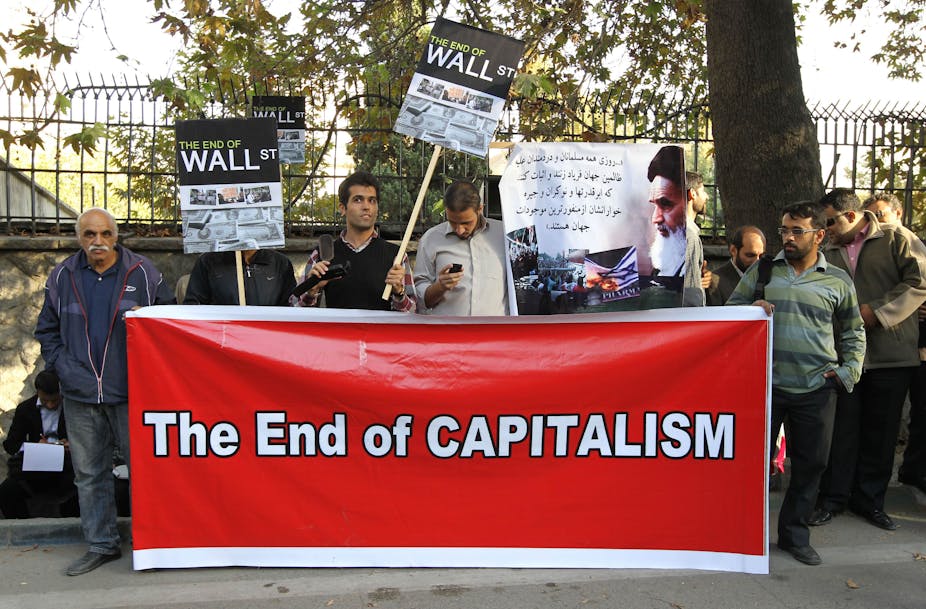The “Occupy” movement has swept the world in the last five weeks, as seems appropriate in this year of demonstrations by people tired of a clapped-out status quo.
Of course, the Occupy movement is quite different to those that overran Tahrir Square or who now bravely withstand the bullets of the Syrian state.
Yet economic downturns, coupled with extreme inequalities (whether it be between political elites, their cronies and the masses; or between economic elites which dominate economic and political space, and the “99%”), are a key factor in all of the protests in this epic year of discontent.

The Occupy strand of protest seemed to start in New York with Occupy Wall Street, but protests in Greece (over austerity measures), Spain (mass youth unemployment) and Israel (rising costs of living) were earlier precursors.
The Occupy crowd’s main beef is with the iniquities wrought by disproportionate global and local corporate power, a grievance underscored in the US where former World Bank Economist Joseph Stiglitz has highlighted how the top 1% in that country control 40% of wealth and 25% of income.
However, that narrative is supplemented by other gripes, some of which are very general, some of which contradict and some of which seem quite “fringe”.

Beyond that, their “demands” or “solutions” are unclear. This lack of an articulated manifesto has attracted much scorn, the idea being that unless they tell us what they want and how we get there, they should shut up and get out of our way.
But that’s not a fair criticism. Surely one can have a sense that the current system is unwell without having all of the solutions to fix it.
If you can’t validly protest the status quo without knowing exactly how to change it (particularly difficult for those without power who are most likely to be dissatisfied), that’s a playing field designed to entrench “the way it is” (whether one likes it or not).
Instead it is surely legitimate, as is happening with Occupy, to start conversations on change, whether they result in concrete steps or not. Part of the point of Occupy is to get people talking about political and economic systems and the possible need for change, and in that respect it is probably succeeding.

The unwieldy nature of Occupy is partly due to its lack of leadership, a phenomenon that it shares with the demonstrators of Egypt, Tunisia, Bahrain, Syria et al.
It may be a function of how social media has been used to galvanise and organise the protests – there is no central hierarchy but there are many who are spreading the word, even to those not attending which expands the conversation.
A desire for inclusiveness has let many into the tent, and why not? It all adds to a new conversation which is not dominated by the “same old” powerbrokers.
(By the way, the sneering criticism that protesters are hypocritical for using technology misses the point: one can be unhappy with “bad” capitalism and greed, and use an iPhone).
So what of Australia and local Occupy protests? Sure, the economic problems and inequalities are not as bad here.

But does that matter? Can’t people express solidarity with the millions protesting overseas? Can’t they complain about disproportionate corporate power in Australia?
After all, a proposed mining tax was widely attacked for the government’s failure to consult adequately with big miners and was then fundamentally altered to accord with their demands.
In contrast, a few years ago the army was sent into Aboriginal communities without the same mainstream concerns over appropriate consultation.
Most cities overseas that have experienced Occupy protests have not forcibly evicted them, as occurred last weekend in Melbourne and Sydney.
Critics railed that the protesters were somehow harming others’ rights. The evidence of the detrimental impact of small camps (even smaller in the daytime as many protesters worked) in an often moribund square in Melbourne and in a very large square in Sydney, is anecdotal and equivocal.
Sure, some found them irritating, but I suspect that feeling was balanced by the curiosity and inquiry the protests prompted in others.
And the predictable laments of violence by politicians miss the point that no violence occurred before the evictions, and they fail to identify just who was perpetrating the violence during the evictions.
It’s not “violent” to fail to obey a police officer: it’s called civil disobedience, a historical phenomenon for which we should all be grateful.
As for the idea that the protesters have had a week to have their say so it’s time to go, The Australian was right to point out that the meter does not tick on free speech and assembly.
And the time should not vary according to whether the powers that be agree with or understand a particular protest.
Certainly, Melbourne mayor Robert Doyle’s motivations seem partially driven by his inability to comprehend what the protests are for, with that puzzlement convincing him they must be wrong and “bad”.
In contrast to Occupy Sydney and Melbourne, Clubs Australia has been bellowing its anti-pokies message for well over a week: so it makes a difference that it can pay?
And the conversations at the Occupy protests seem more likely to be enlightening and edifying than the tedious “debate” that dominates our current Federal Parliament, where politicians hammer the same old soundbites (“stop the boats”, “toxic tax”, “Julia lied”, “people smugglers’ business model”) … for far, far longer than a week.

